

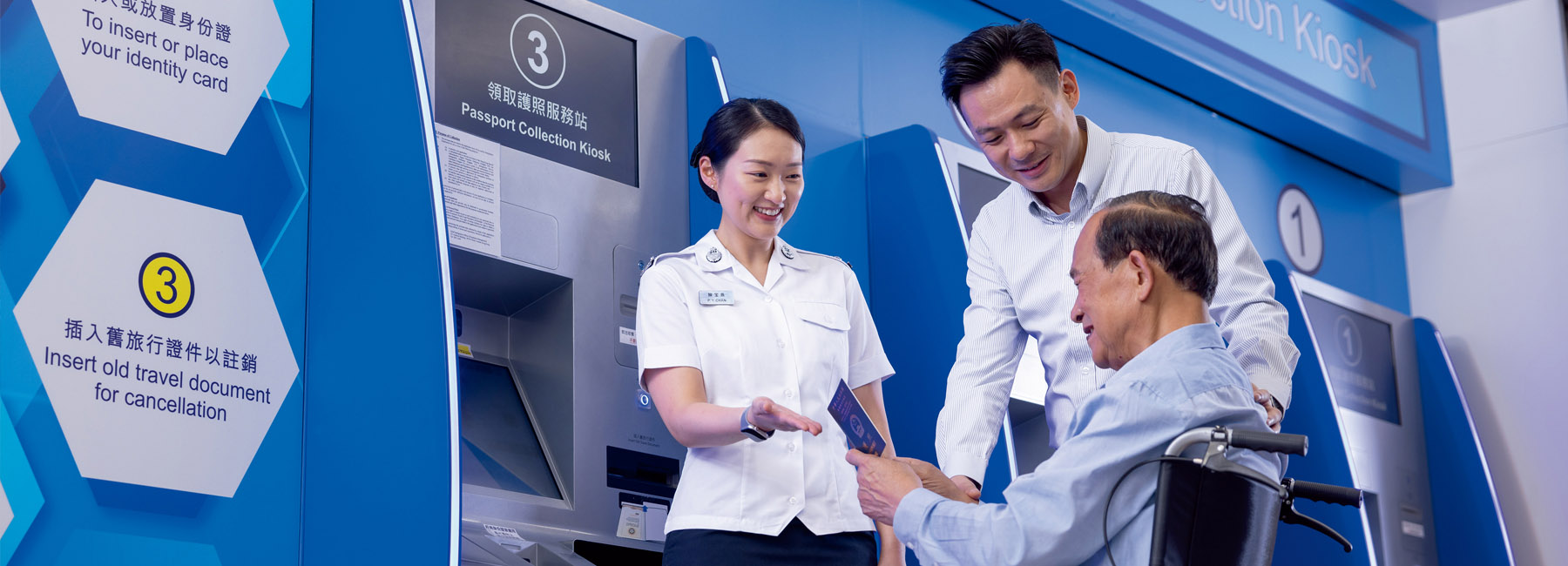



Commanded by an Assistant Director, the Personal Documentation Branch comprises the Documents Division and the Registration of Persons Division. Each division is headed by a Principal Immigration Officer.
The Documents Division deals with applications for Hong Kong Special Administrative Region (HKSAR) passports and other HKSAR travel documents, matters relating to the implementation of the Nationality Law of the People's Republic of China in Hong Kong, as well as registration of births, deaths and marriages. The Registration of Persons Division deals with applications relating to claims to the right of abode under the Basic Law, issuance of identity cards to Hong Kong residents, maintenance of registration of persons records, implementation of the 'Territory-wide Identity Card Replacement Exercise', negotiations with foreign governments over visa-free travel arrangements for HKSAR residents and provision of assistance to Hong Kong residents in distress outside Hong Kong. The Registration of Persons and HKSAR Passports Appeal Section under the Registration of Persons Division is responsible for handling appeals relating to permanent identity card and HKSAR passport applications.
The Immigration Department is responsible for registration of persons and issuance of identity cards as well as providing related services to Hong Kong residents. The Director of Immigration is appointed as the Commissioner of Registration, while Immigration Officers and clerical staff posted to the Registration of Persons Offices are appointed as registration officers. At present, registration of persons services are provided in six offices: one on Hong Kong Island, two in Kowloon and the other three in the New Territories. Among these offices, the Registration of Persons Office at the Tuen Mun Siu Lun Government Complex is the first regional office designed with the concept of one-stop service. The department has extended the one-stop service to the Registration of Persons Offices in other regions in phases since September 2022 and will review the effectiveness in due course.
Since 1949, all Hong Kong residents have been required to register for identity cards. The first kind of identity cards were of paper type. These paper identity cards were subsequently replaced by laminated ones upon implementation of the Registration of Persons Ordinance in 1960. For better maintenance of records, a Territory-wide Identity Card Re-issue Exercise was launched in 1983 to introduce identity cards which were more secure against counterfeiting. It was followed by the second Identity Card Re-issue Exercise starting on 1 July 1987 when Hong Kong permanent identity cards containing a statement that the holder had the right of abode in Hong Kong were issued to permanent residents, while Hong Kong identity cards (HKICs) without such a statement were issued to non-permanent residents.
The department has been replacing existing smart identity cards for all Hong Kong residents from 26 November 2018 onwards. The new smart identity card, made of high-quality polycarbonate materials with multiple state-of-the-art security features and designs, provides stronger protection against counterfeiting. Furthermore, the new smart identity card supports a contactless chip interface on top of the current contact chip interface. This reduces possible wear and tear to the identity card and the chip due to card reading, thus making the identity card more durable. Meanwhile, holders of new smart identity cards can enjoy more convenient and faster immigration clearance through the Automated Passenger Clearance System (e-Channel).
The smart identity card enables the department to use fingerprint identification technology to quickly authenticate the card holder's identity. Hong Kong permanent residents aged 11 or above holding a smart identity card are able to enjoy the convenience of performing immigration clearance at e-Channels in control points.
Cross-boundary drivers who are Hong Kong permanent residents holding a smart identity card are able to use the vehicular e-Channels at vehicular control points. This service has been extended to certain categories of eligible non-permanent residents for the convenience of the public.
Hong Kong residents holding a Document of Identity for Visa Purposes (Doc/I), persons who have the right to land or are on unconditional stay in Hong Kong, or non-permanent residents issued with a notification label can use the e-Channel service.
Moreover, Hong Kong permanent residents aged 11 or above may travel to Macao on the strength of their valid smart identity cards and enjoy enhanced immigration facilitation by using the Macao Automated Passenger Clearance System after successful enrolment. This facilitation measure has been extended to Hong Kong non-permanent residents holding an HKSAR Doc/I or an HKIC. Eligible persons may, after enrolment, use Macao's automated immigration clearance service for immigration clearance.
Apart from immigration-related applications, the smart identity card also supports other non-immigration applications, such as the library card of Hong Kong Public Libraries. Members of the public are free to choose whether to apply for using their identity cards for non-immigration applications.
Consular Corps Identity Cards (CCICs) are issued to consuls, consular staff, the head and members of the Office of the European Union to Hong Kong, and their spouses and dependent children of the age of 11 or above.
All members of the Consular Corps had their CCICs replaced in 2020. The new CCIC is in the form of a smart card made of polycarbonate materials and embedded with a chip module of dual (contact and contactless) interfaces. The card size is similar to a standard credit card. Furthermore, to better protect against forgery, the new CCIC has a number of security features.
Under the Registration of Persons Ordinance, Hong Kong residents aged 11 or above are required to register for an identity card unless they are specifically exempted or excluded from such provisions, for example, the aged, the blind and the infirm. Any person who is not the holder of an identity card and is required by law to be registered must apply for one within 30 days from the date of his/her arrival in Hong Kong or from the date when he/she is so required. In 2022, 255,811 and 133,873 identity cards were issued to permanent residents and non-permanent residents respectively.
The Registration of Persons Tribunal is established under section 3C of the Registration of Persons Ordinance to provide people with a channel of appeal arising from the decision of not to issue a permanent identity card or to declare a permanent identity card issued to be invalid. In 2022, the department received 80 appeals from the tribunal.
Replacement identity cards are issued to persons whose previous identity cards have been lost, destroyed, damaged or defaced, or whose identity cards require amendments because of changes in personal particulars such as the name or date of birth. In 2022, 134,363 replacement identity cards were issued.
One-way Permit entrants aged 11 or above may simultaneously submit applications for a Doc/I when applying for first registration for an HKIC at the Registration of Persons – Kowloon Office.
The 24-hour Telephone Appointment Booking System and the service for online appointment booking for identity card application of the GovHK website are introduced to offer convenient booking of registration of persons services. The appointment booking period for identity card application has been extended to 24 working days. Subsequent changes to or cancellation of an appointment can also be made one working day prior to the scheduled appointment date.
Members of the public can make an appointment and pre-fill the form for identity card application through the GovHK website, and choose to have a free reminder sent to them two days before the appointment date. Members of the public can also use the Immigration Department Mobile Application to book appointments and fill in forms in advance for a faster and more convenient application process.
Certificates of Registered Particulars are issued to provide detailed records of the particulars furnished or reported to a registration officer, including those which are not shown on identity cards. They are used for a number of purposes. One of them is to support applications for emigration. In 2022, 20,475 certificates were issued.
One of the main tasks of the department is to maintain registration of persons records of a population of over 7 million. To facilitate storage, retrieval and maintenance of these records, all of them were converted to digital images. The Image Management System, which has replaced the old microfilm technology, facilitates round-the-clock identity card record checks for other law enforcement departments and helps combat illegal immigration effectively.
Since the commencement of the 'Territory-wide Identity Card Replacement Exercise' (Replacement Exercise) on 27 December 2018, the nine dedicated Smart Identity Card Replacement Centres (SIDCCs) have been running smoothly. As at 31 December 2022, the department had issued around 7.6 million new smart identity cards, of which around 5.9 million were issued under the Replacement Exercise.
The first cycle of the Replacement Exercise commenced on 27 December 2018. Disrupted by the Coronavirus Disease 2019 (COVID-19) pandemic, the services of the nine SIDCCs were once suspended in 2022, and the call-up programme was revised accordingly. The original application period of the fourth cycle was revised to cover the period from 20 September 2021 to 23 July 2022. Hong Kong residents born in the years from 1977 to 1984 and 1987 to 1988 were required to have their identity cards replaced at an SIDCC within their respective specified periods.
The fifth cycle of the Replacement Exercise covered the period from 8 April 2022 to 14 January 2023. Hong Kong residents born in the years of 1954 or before and from 1989 to 2000 were required to have their identity cards replaced at an SIDCC within their respective specified periods.
Through the use of technology, a number of new elements have been introduced into the Replacement Exercise. Members of the public may make appointments and fill in forms in advance through the Internet or the Immigration Department Mobile Application, so as to save the queuing time and enjoy a faster replacement process. To enhance service efficiency, various self-service kiosks have also been provided in the SIDCCs to facilitate the acquisition of tags, filling of forms and collection of new identity cards by members of the public. Compared with the last Replacement Exercise, the processing time for registration at the SIDCCs has been shortened from 60 minutes to 30 minutes. In addition, there is a series of barrier-free facilities in the SIDCCs, including the indoor navigation system for visually impaired persons, which has been adopted by the government for the first time.
In view of the demographic changes in Hong Kong and to provide more convenience for groups in need, the department has introduced new caring arrangements into the Replacement Exercise:
Under the law, all Hong Kong permanent residents have the right of abode in Hong Kong which includes the right to land in Hong Kong, the right to be free from any condition of stay in Hong Kong, and the right not to be deported or removed from Hong Kong.
Article 24 of the Basic Law sets out six categories of persons who are permanent residents of the HKSAR. The conditions for acquiring the right of abode in Hong Kong are clearly defined in the relevant provisions under the Immigration Ordinance.
After Hong Kong's return to the Motherland, the department started to process the right of abode applications in accordance with the Basic Law and the Immigration Ordinance. Eligible applicants aged 11 or above will be arranged to register for a permanent identity card under the provisions of the Registration of Persons Ordinance. Eligible applicants aged under 11 will be issued with a letter confirming their eligibility. If they hold valid travel documents, they may apply for an endorsement to be made on their travel documents confirming that their eligibility for a permanent identity card has been verified. In 2022, the department received a total of 67,910 VEPIC applications. In the same year, the processing of 66,081 applications in total were finalised.
To provide more facilitation for applicants, e-Services for the submission of VEPIC applications have been provided. Applicants may submit their VEPIC applications online by completing an application form and scanning relevant supporting documents through the GovHK website. Where necessary, they may also make use of the e-Services to submit additional documents, or to enquire about or change their scheduled appointments for verification of the originals of supporting documents. Moreover, applicants who have submitted VEPIC applications may also enquire about the application status through the Internet or the 24-hour Telephone Enquiry System.
To provide greater travel convenience for HKSAR passport holders, the department has made sustained efforts to actively lobby more countries for visa-free or visa-on-arrival access for HKSAR passport holders. As at the end of 2022, a total of 168 countries and territories had granted visa-free or visa-on-arrival access for HKSAR passport holders.
The Assistance to Hong Kong Residents Unit (AHU) of the department has been working closely with the Security Bureau, the Office of the Commissioner of the Ministry of Foreign Affairs of China in Hong Kong (OCMFA), the Chinese diplomatic and consular missions (CDCMs) overseas, the consulates in Hong Kong, the Office of the Government of the HKSAR in Beijing, the Hong Kong Economic and Trade Offices in Guangdong, Shanghai, Chengdu and Wuhan, and other government departments in providing practicable assistance to Hong Kong residents in distress outside Hong Kong. Hong Kong residents in any country or territory who are in need of urgent assistance may contact the AHU's 24-hour hotline on (852) 1868 or, by using the Immigration Department Mobile Application, call the 1868 Hotline with network data or fill in the Online Assistance Request Form for seeking assistance.
To provide timely and professional guidance and assistance to Chinese citizens in distress overseas, the Ministry of Foreign Affairs (MFA) has set up its Global Emergency Call Centre for Consular Protection and Services (Emergency Call Centre) and launched the 24-hour hotline 12308 for consular protection. The MFA's Emergency Call Centre will, according to the actual circumstances and needs, refer assistance requests from Hong Kong residents to the AHU for handling and follow-up.
In 2022, the AHU handled 100,740 enquiries and 1,679 requests for assistance. During the year, the AHU set up a designated WhatsApp hotline to facilitate communication between the AHU and the assistance seekers who were suspected to have been lured to work in Southeast Asian countries. The AHU received a total of 46 requests for assistance in relation to such matter.
The department has been working closely with the OCMFA to promote and disseminate information on consular protection at schools and in the community with a view to bringing the messages on outbound travel safety and consular protection to more people. In 2022, the department actively participated in various community activities, such as organising a number of exhibitions in celebration of the 25th anniversary of the establishment of the HKSAR, and co-hosting seminars with the OCMFA in the 36th Hong Kong International Travel Expo, to introduce information on outbound travel safety and consular protection. Besides, relevant seminars have also been organised from time to time for different universities, industries and organisations. In 2022, the department organised a total of 20 relevant promotional campaigns with the participation of more than 5,000 members of the public, representing an increase of more than 50 per cent as compared with the figure in 2021.
Hong Kong residents may input their contact details and itineraries through the online service of Registration of Outbound Travel Information (ROTI) before travelling outside Hong Kong. The information provided will enable the AHU to contact and help the registrants in the event of an emergency outside Hong Kong. The registrants can receive updates on Outbound Travel Alerts and related public information via their registered email address in addition to their 'My Messages' box of 'MyGovHK'. They may also register their overseas mobile phone numbers and choose to receive SMS messages with such phone numbers. From 30 December 2020 onwards, Hong Kong residents can login to the ROTI service and receive relevant personalised notifications with their personal mobile phones through the 'iAM Smart' mobile application.
Apart from the Immigration Headquarters, the department provides services to members of the public through its seven Immigration Branch Offices at convenient locations, including one on Hong Kong Island, two in Kowloon and four in the New Territories. Among these offices, the Tuen Mun Regional Office at the Tuen Mun Siu Lun Government Complex provides one-stop personal documentation service for the public. To further enhance service quality, in addition to the services of births and marriage registration, the office processes applications for HKSAR travel documents, HKICs and extension of stay in Hong Kong. It is also equipped with self-service kiosks. Members of the public applying for births registration or HKICs at the Tuen Mun Regional Office may choose to apply for HKSAR travel documents at the same time. The one-stop service for application for HKICs and HKSAR travel documents has been implemented at the Registration of Persons Offices in other regions in phases since September 2022.
The Hong Kong Special Administrative Region Passports Ordinance provides for the issue of HKSAR passports and other related matters while the authority for the issue of other HKSAR travel documents is enshrined in the Immigration Ordinance and the Immigration Regulations.
The Immigration Department is the sole government department responsible for issuing HKSAR passports. Under the law, HKSAR passports are issued only to Chinese citizens who have the right of abode in Hong Kong and hold valid Hong Kong permanent identity cards. Applications for HKSAR passports can be submitted by post, through drop-in boxes or in person. Eligible applicants holding a valid Hong Kong Permanent Identity Card may also submit their applications via Travel Document Submission Kiosks, the Internet or the Immigration Department Mobile Application, and choose to collect their HKSAR passports at Passport Collection Kiosks in a self-service manner.
The department started issuing HKSAR electronic passports on 5 February 2007, and introduced the Next Generation HKSAR Electronic Passport on 14 May 2019. The new electronic passports not only continue to be produced in compliance with the standards set by the International Civil Aviation Organisation, but also incorporate state-of-the-art security features to boost overseas authorities' confidence in granting HKSAR passport holders visa-free access to their countries and territories. For example, a specially made transparent window with the holder's portrait engraved therein by laser engraving technology is added onto the bio-data page, of which the Golden Bauhinia Square forms the main theme. The passport issuing procedures are monitored and controlled by a unique computer system, while the production sites at the Immigration Headquarters are guarded by stringent security measures and installations. The HKSAR passport has won international recognition and is regarded as one of the most secure passports in the world.
The department has all along been committed to facilitating members of the public's application for and collection of travel documents. From 30 October 2020 onwards, applicants in Hong Kong or overseas who submit their HKSAR passport applications directly to the department by whichever means may choose to collect their passports at designated CDCMs. Applicants overseas may also submit their applications through the local CDCMs. In 2021, the department introduced new measures for application for and collection of HKSAR travel documents in the Mainland. With effect from 29 November 2021, the Immigration Divisions of the five Mainland Offices of the HKSAR Government process not only applications for replacement of HKSAR passports but also first applications for HKSAR passports from eligible applicants. Applicants who submit their HKSAR passport applications directly to the department by whichever means may choose to collect their passports at the Mainland Offices.
With the decrease of outbound travel by Hong Kong residents during the pandemic, a large number of their HKSAR passports have been expired and pending renewal. The department specially introduced from 13 July to 10 September 2022 the innovative HKSAR Passport Mobile Application Stations (PMAS), which were promotional vehicles that travelled around all 18 districts throughout Hong Kong to provide members of the public with the service of online application for an HKSAR passport, so as to call on and assist them to renew their HKSAR passports early to prevent any delay in future outbound travel. During the operation of the PMAS, more than 10,000 residents were provided with the service of submitting an application for an HKSAR passport.
In 2022, the department received 684,224 HKSAR passport applications. As at the end of 2022, the department had received a total of 14,199,346 HKSAR passport applications and issued 13,587,727 passports.
The HKSAR Passports Appeal Board is established under the Hong Kong Special Administrative Region Passports (Appeal Board) Regulation to provide unsuccessful applicants of HKSAR passports with a channel of appeal. In 2022, the department received four appeals from the Appeal Board.
A Doc/I is valid for seven years. It is issued to Hong Kong residents who are unable to obtain a national passport or travel document of any other countries or territories. The vast majority of the applicants are legal immigrants from the Mainland who have not yet resided in Hong Kong continuously for seven years. The department introduced the Next Generation HKSAR Electronic Doc/I on 14 May 2019. From November 2021 onwards, eligible applicants in the Mainland may submit their applications for replacement of Doc/Is in person at the Immigration Divisions of the Mainland Offices or by post to the department, and may choose to collect their Doc/Is at any Immigration Divisions of the Mainland Offices. In 2022, 27,595 Doc/Is were issued.
A Re-entry Permit is valid for a maximum period of five years and is used for travelling to and from Hong Kong and the Mainland or Macao. It is issued mainly to Hong Kong residents who are Chinese citizens and have the right of abode or have been granted unconditional stay in Hong Kong. Given that most Hong Kong residents have used their identity cards for immigration clearance when travelling to the Mainland or Macao since the introduction of e-Channels, Re-entry Permits are used mostly by children under the age of 11 and residents who have lost their identity cards but need to travel to and from the Mainland or Macao before they are issued with replacements. From November 2021 onwards, eligible applicants in the Mainland may submit their applications for replacement of Re-entry Permits in person at the Immigration Divisions of the Mainland Offices, and authorise a Hong Kong referee to pay the application fee and collect the Re-entry Permit on their behalf at a selected Immigration Branch Office. In 2022, 23,671 Re-entry Permits were issued.
A Seaman's Identity Book is valid for 10 years. It is issued to seafarers who are Hong Kong residents having the right of abode or having been granted unconditional stay in the HKSAR, including non-Chinese citizens who are unable to obtain a national passport or travel document of any other countries or territories. In 2022, 31 Seaman's Identity Books were issued.
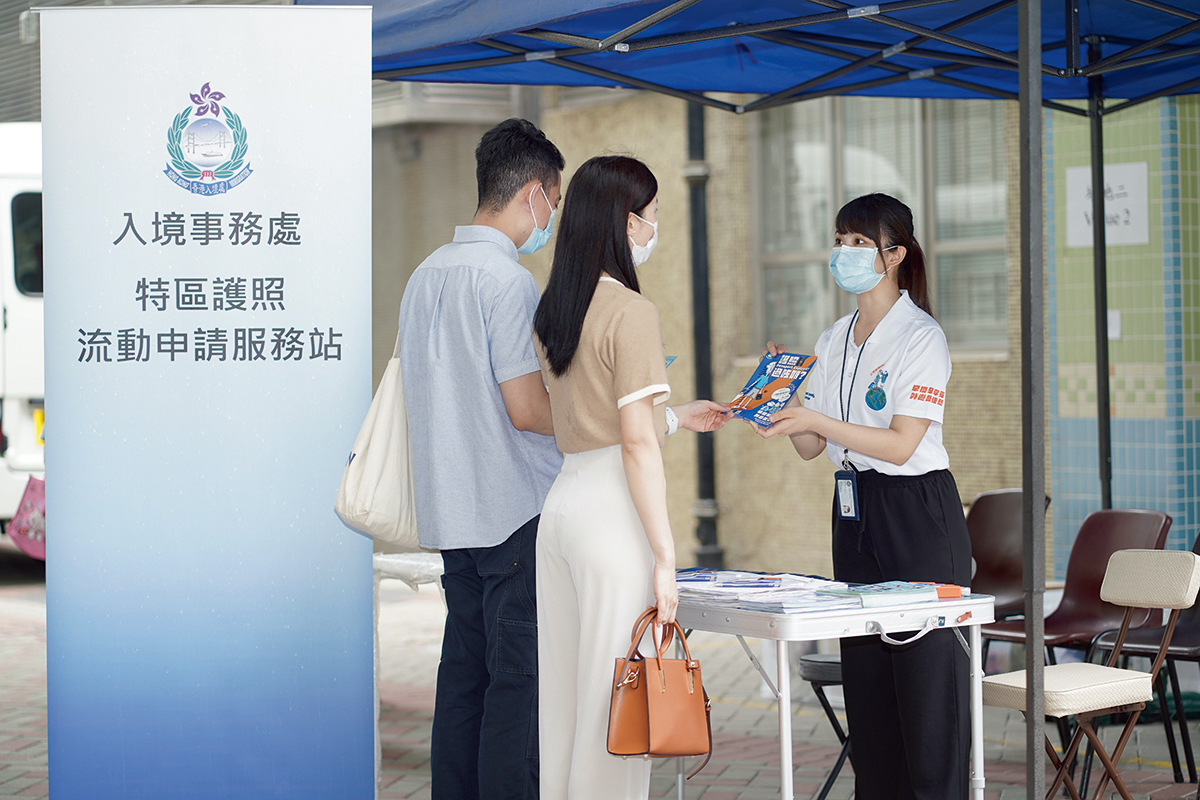
The innovative PMAS provided members of the public with the service of online application for an HKSAR passport.
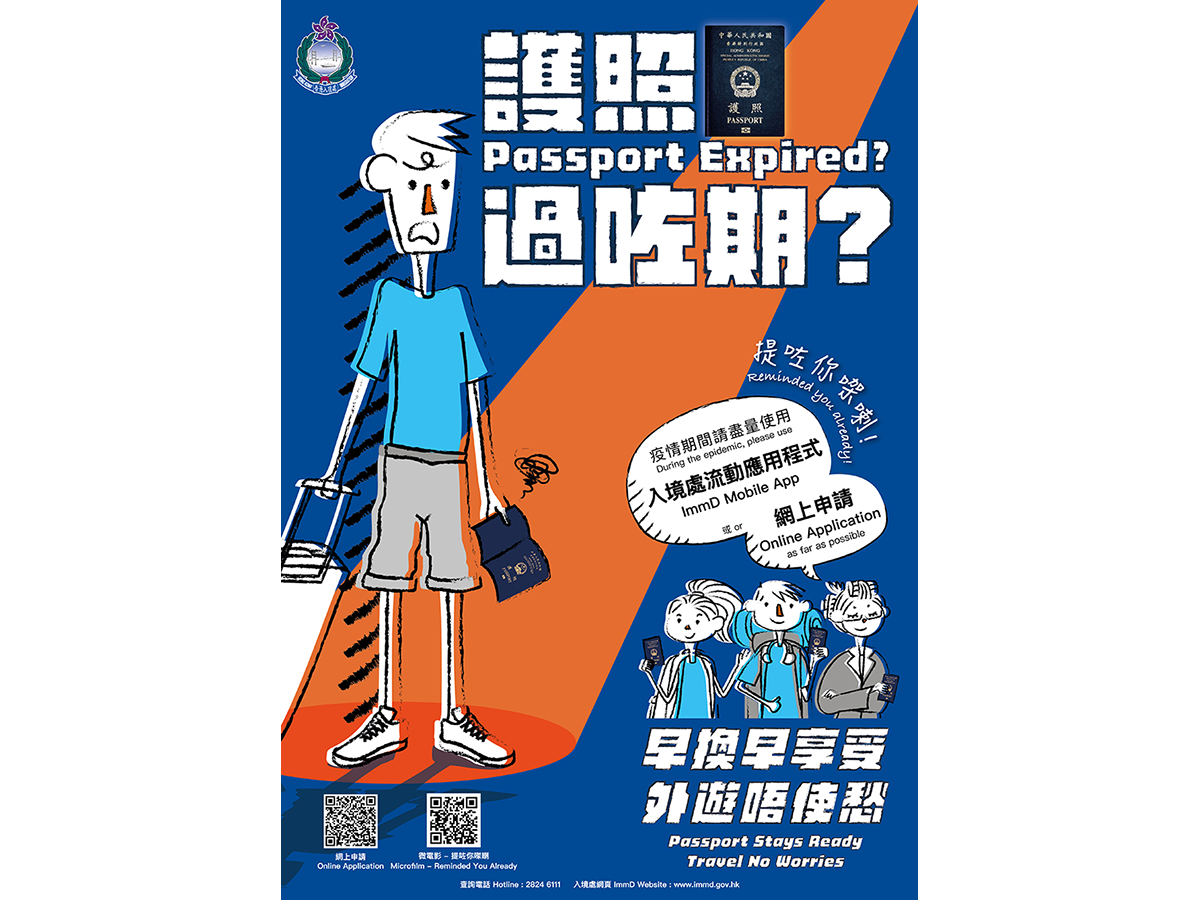
The department makes use of different channels to remind Hong Kong residents to renew their HKSAR passports early to prevent any delay in future outbound travel.
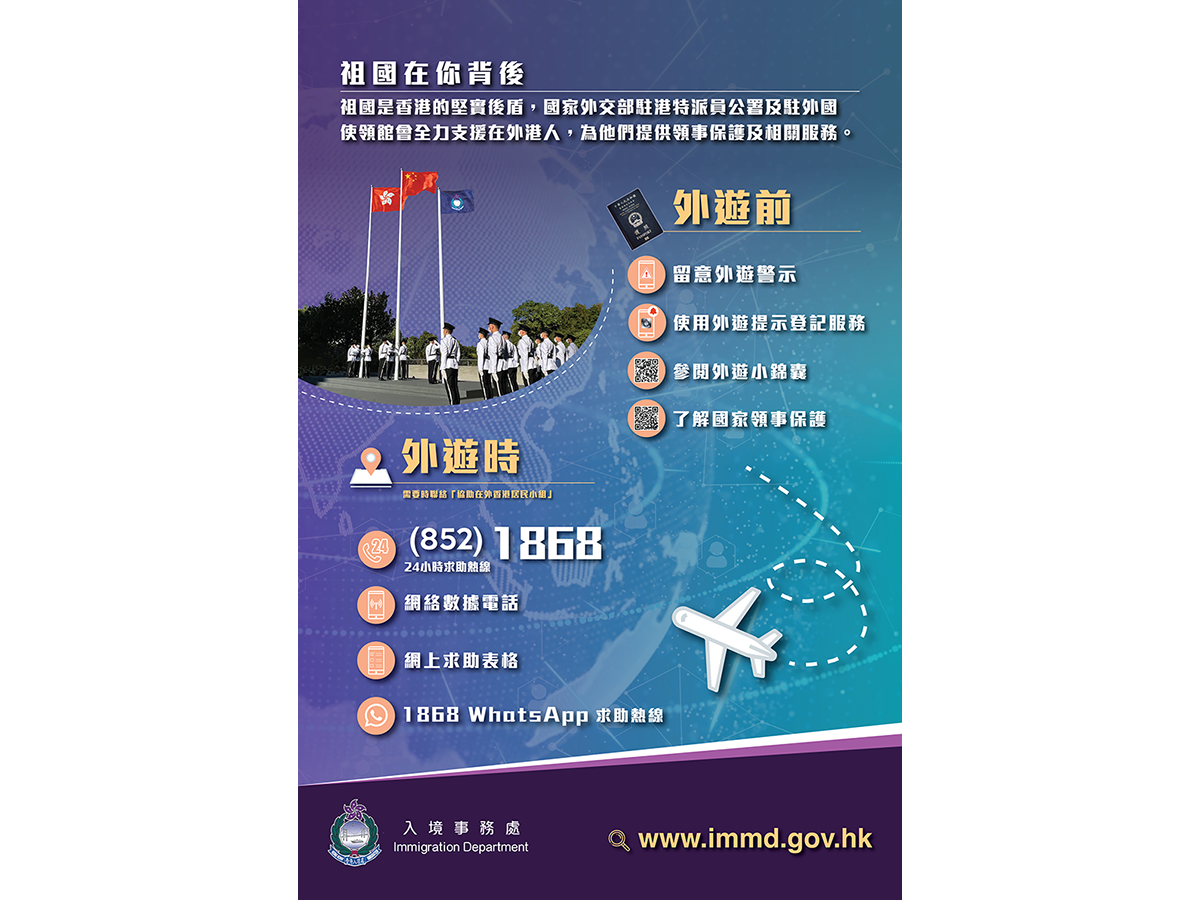
AHU can be contacted with different means to provide Hong Kong residents in any country or territory with urgent assistance.
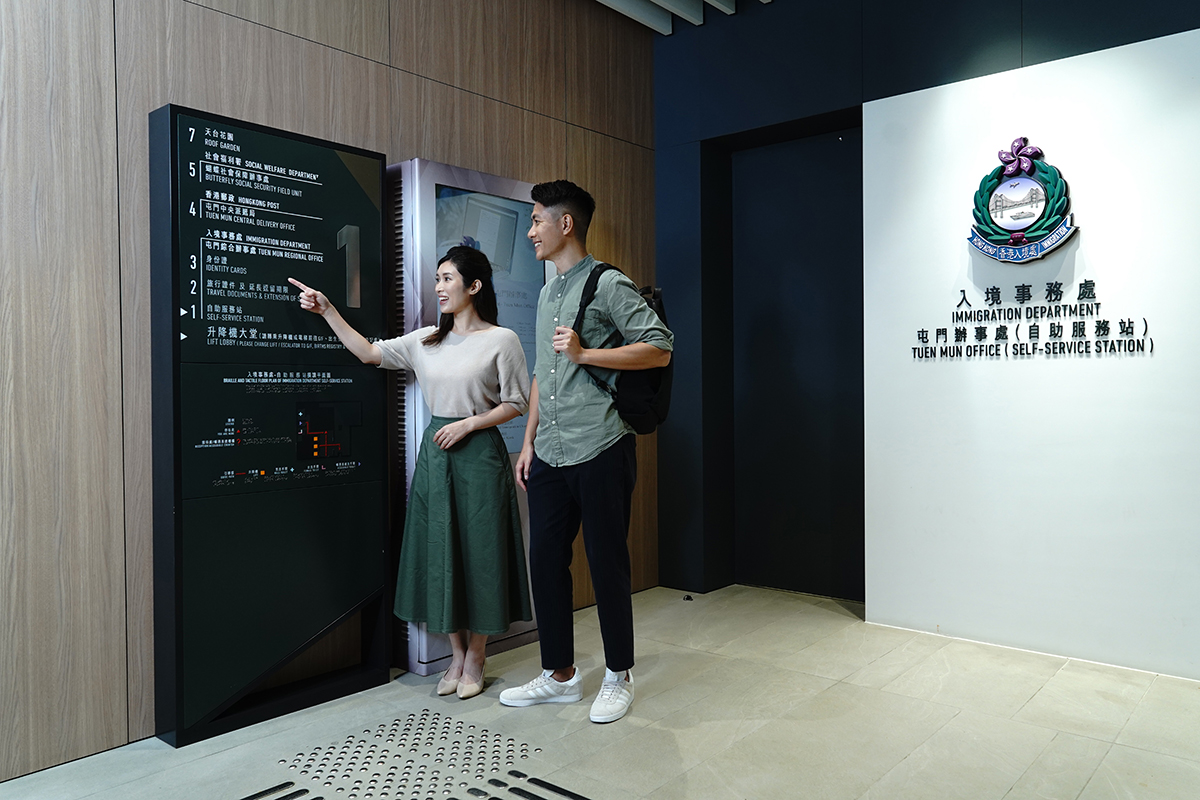
Tuen Mun Siu Lun Government Complex is the first regional office designed with the concept of one-stop service.
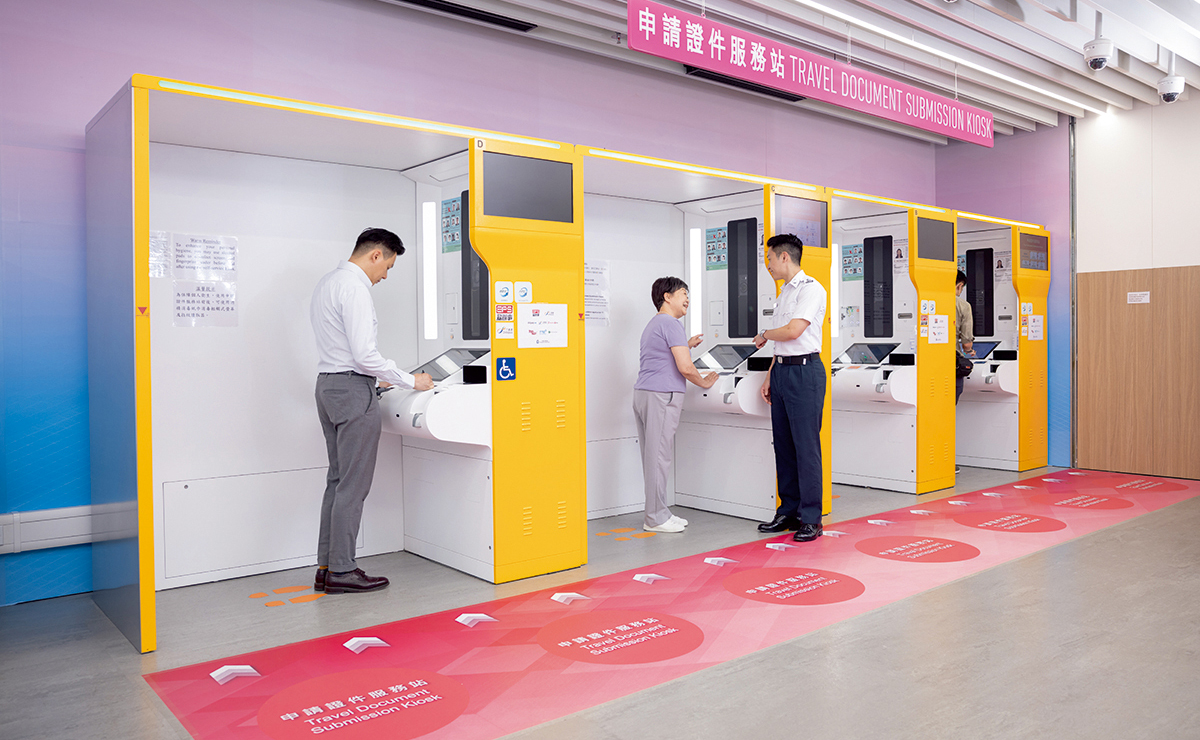
The Travel Document Submission Kiosks located at various branch offices allow applicants to submit their passport applications in a self-service manner.
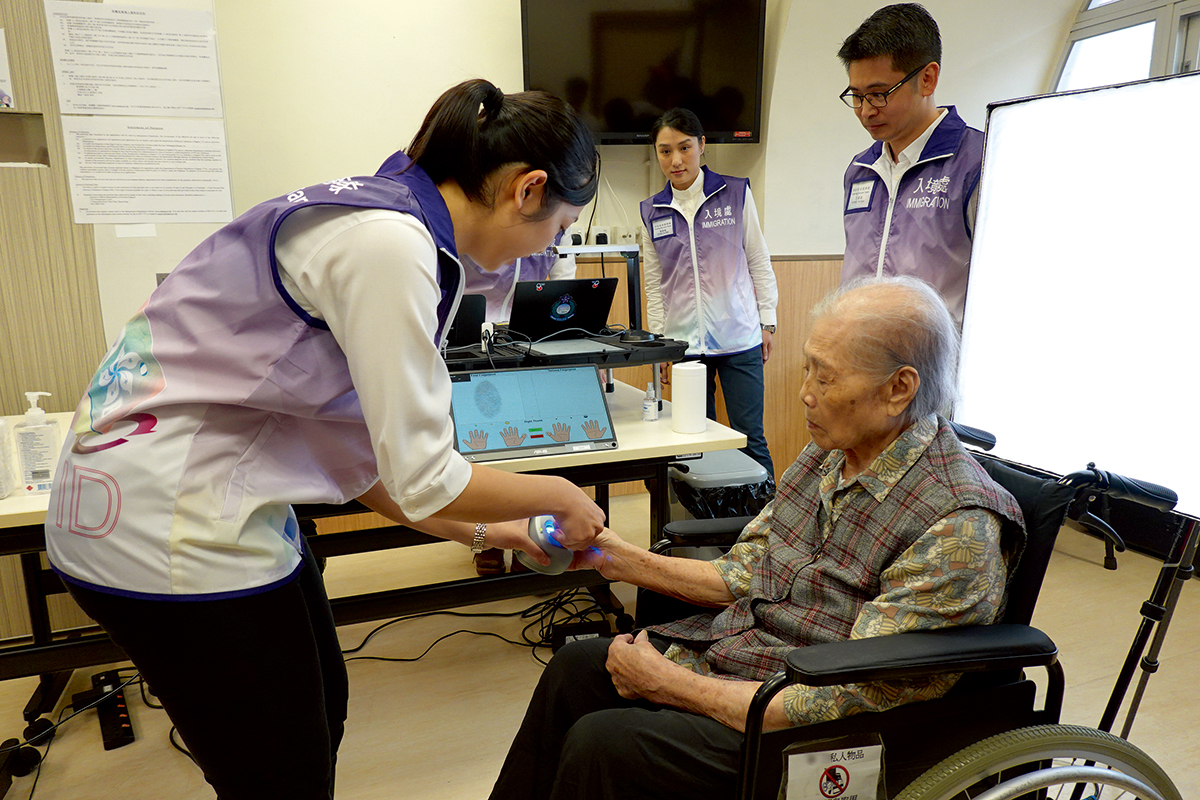
The 'On-site Identity Card Replacement Service' has resumed since November 2022 to provide new smart identity card replacement service for residents of residential care homes for the elderly and persons with disabilities.
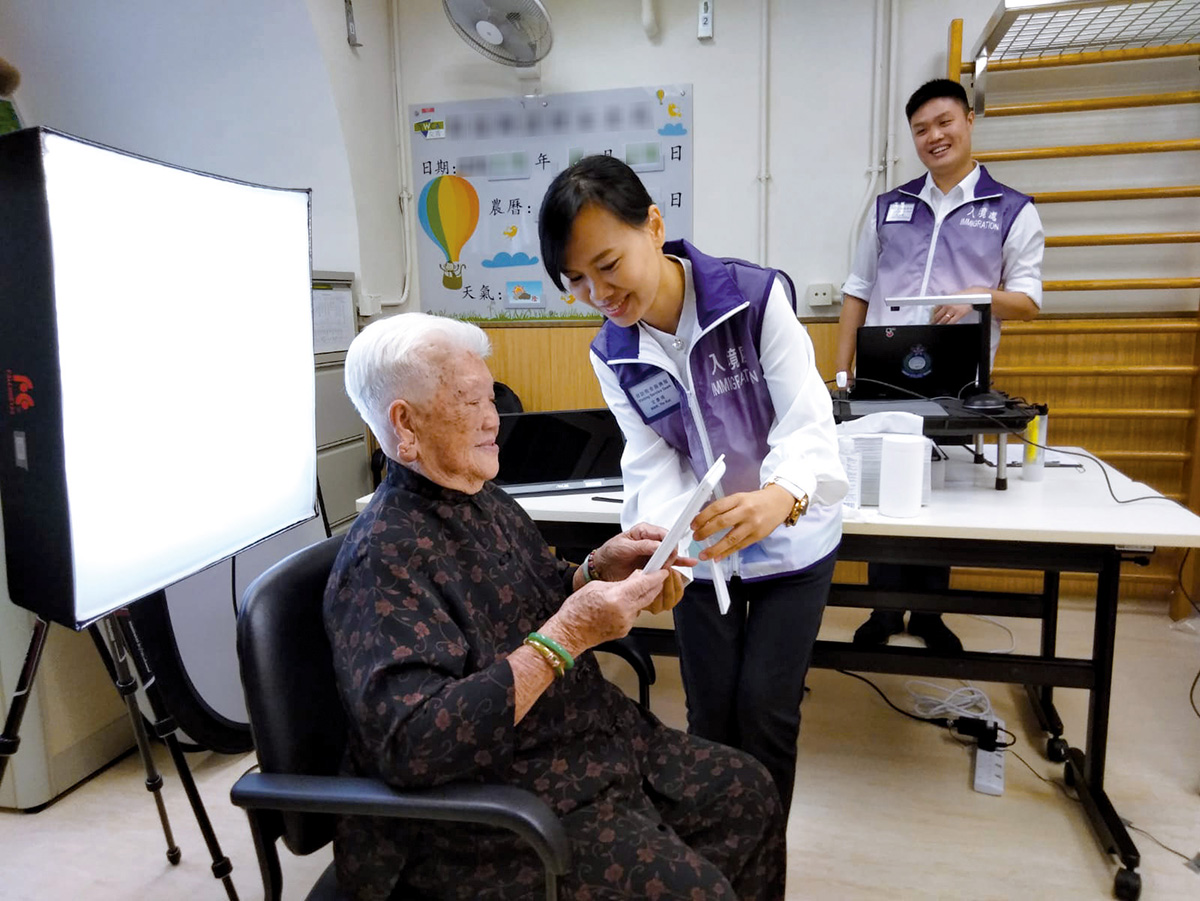
The 'On-site Identity Card Replacement Service' has resumed since November 2022 to provide new smart identity card replacement service for residents of residential care homes for the elderly and persons with disabilities.
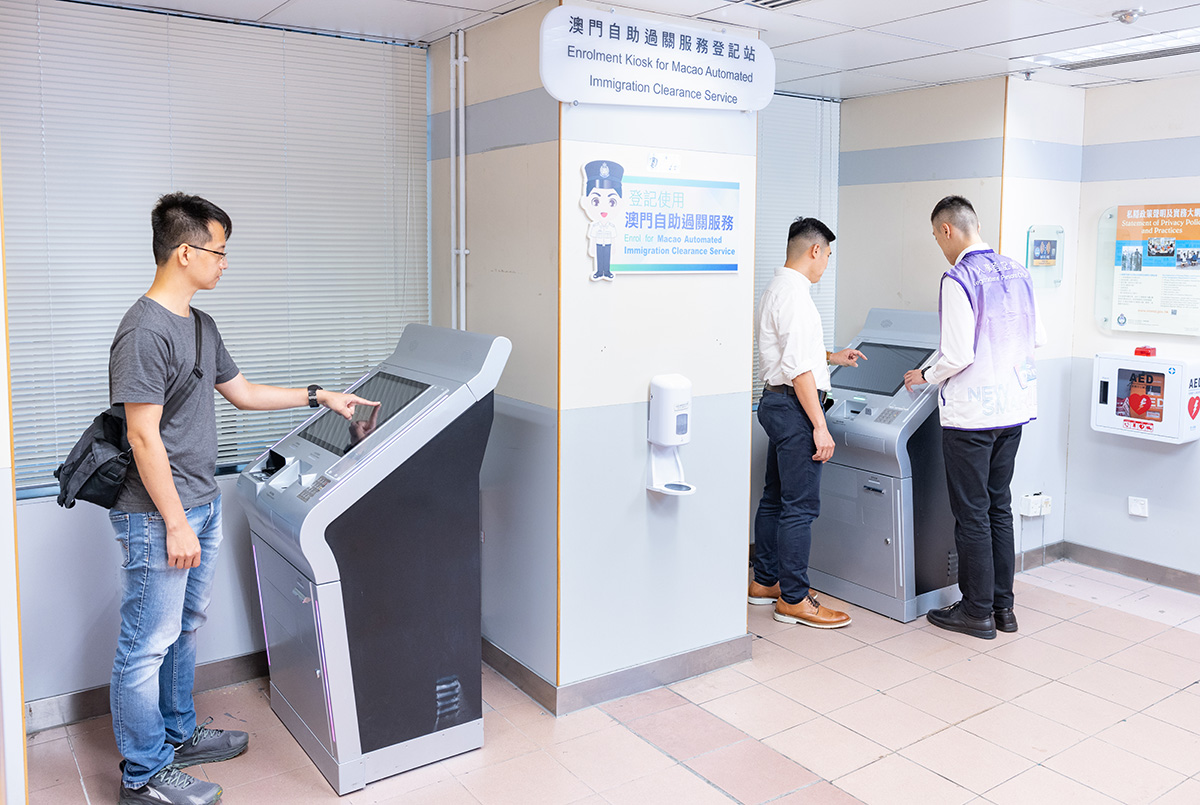
Eligible Hong Kong residents may utlilise the Macao Automated Passenger Clearance System after successful enrolment at Enrolment Kiosk for Macao Automated Immigration Clearance Service.
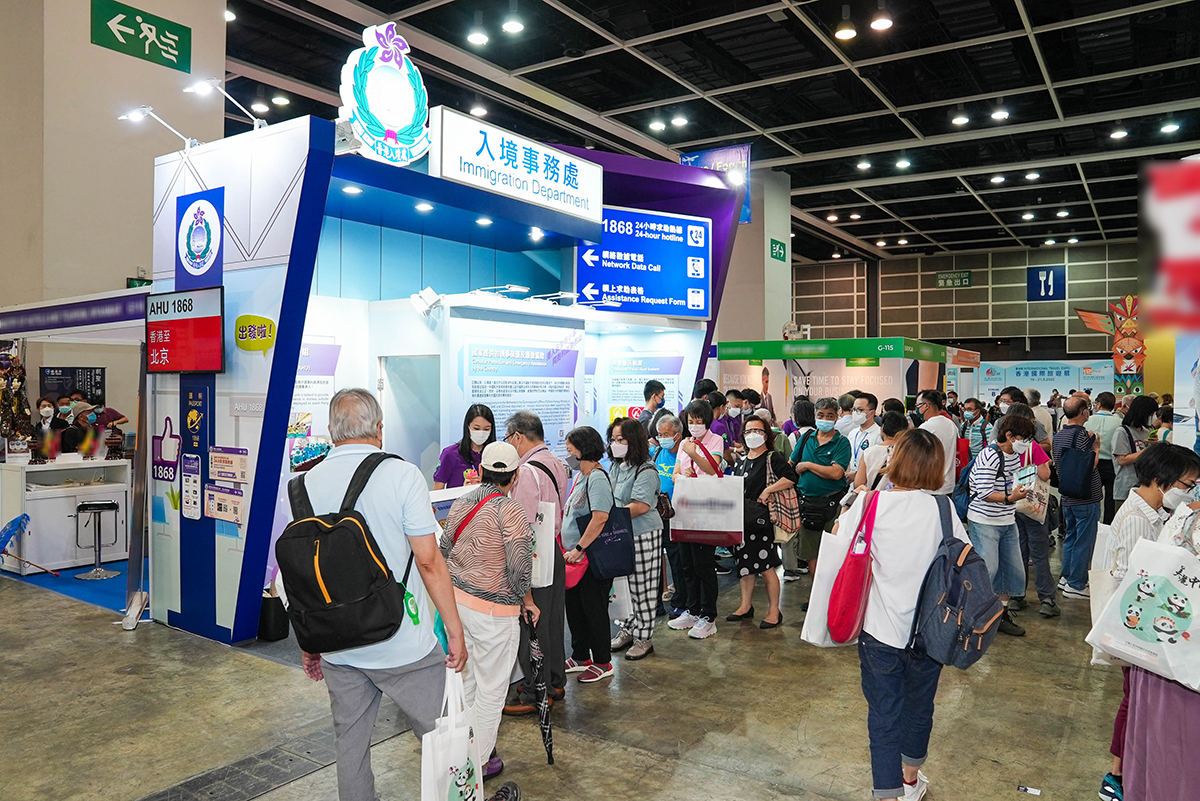
The department participated in the 36th International Travel Expo with a view to promoting outbound travel safety to members of the public.
The department has been authorised by the Central People's Government to deal with nationality-related applications from Hong Kong residents in accordance with the Nationality Law of the People's Republic of China and the 'Explanations' adopted by the Standing Committee of the National People's Congress on 15 May 1996. The Chinese Nationality (Miscellaneous Provisions) Ordinance was enacted to provide for matters relating to the implementation of the Nationality Law of the People's Republic of China in the HKSAR.
Hong Kong residents who are Chinese nationals holding foreign passports may make a declaration of change of nationality to the department if they would like to be regarded as foreign nationals in Hong Kong. In 2022, 210 applications for declaration of change of nationality were received from Hong Kong residents.
In 2022, the department received 1,497 applications for naturalisation as a Chinese national, 342 applications for renunciation of Chinese nationality and 4 applications for restoration of Chinese nationality.
For nationality applications (including declaration of change of nationality, naturalisation as a Chinese national, and renunciation and restoration of Chinese nationality), apart from submitting the applications directly to the department, overseas Hong Kong residents may also submit the applications to the department through the local CDCMs.
The department has been responsible for the registration of births, deaths and marriages, and the provision of related services. The Director of Immigration is appointed the Registrar of Births and Deaths and the Registrar of Marriages while Executive Officers posted to marriage registries and Immigration Officers posted to marriage registries or births and deaths registries are appointed deputy registrars. Eligible solicitors or notaries public, if appointed by the Registrar of Marriages as civil celebrants of marriages, may celebrate marriages as stipulated under the Marriage Ordinance. As at the end of 2022, there was a total of 2,141 appointed civil celebrants of marriages.
According to the Births and Deaths Registration Ordinance, any birth in Hong Kong must be registered within 42 days from the day of such birth. Presently, there are four births registries in Hong Kong providing births registration service, viz one each on Hong Kong Island and in Kowloon and two in the New Territories. Under the law, no fee is required for registration of a birth. However, a fee will be charged for post-registration of a birth beyond the prescribed 42 days. A birth that has not been registered within one year can be registered only with the consent of the Registrar of Births and Deaths. In 2022, 27,125 births were registered and 5,825 births were post-registered.
Deaths from natural causes should be registered by the deceased's relatives within 24 hours. There are three deaths registries, including two on Hong Kong Island and one in Kowloon, providing free registration service. Deaths in rural areas may be registered at the 15 designated police stations in the New Territories and on outlying islands. In 2022, 61,557 deaths were registered.
All marriages in Hong Kong are governed by the Marriage Ordinance and the Marriage Reform Ordinance. When one man and one woman wish to marry, either party shall give at least 15 clear days' notice of an intended marriage either in person or through a civil celebrant of marriages to the Registrar of Marriages. The notice will be exhibited at the marriage registries (other than the City Hall Marriage Registry and the Cotton Tree Drive Marriage Registry) and the Marriage Registration and Records Office in Admiralty for at least 15 clear days. The marriage must take place within three months from the date of giving the notice if no objection is received. There are no residential requirements on the marrying parties and they may be of any nationality. However, either party to a marriage must not be under the age of 16 (Gregorian reckoning). Marriage may take place at any of the five marriage registries or the 272 (as at the end of 2022) licensed places of worship, including churches and Hindu Temple. Moreover, marrying parties may also engage a civil celebrant of marriages to celebrate their marriages at any places other than the marriage registries and the licensed places of worship in Hong Kong. In 2022, 13,796 marriages were celebrated at the marriage registries, 1,241 in the licensed places of worship and 14,946 by civil celebrants of marriages.
The Civil Celebrants of Marriages Scheme lifts the restrictions on the time and place of marriage solemnisation. The scheme provides more choices, greater flexibility and convenience for members of the public in arranging weddings. It has been well received by the public and has grown in popularity since it was launched. As at the end of 2022, about 373,000 prospective couples (44 per cent of the total number of applications) gave their notices of intended marriage to Registrars of Marriages through civil celebrants, and about 373,000 couples (47 per cent of the total number of marriage registration) had their marriages solemnised by civil celebrants.
Certain marriages may be post-registered as valid marriages in Hong Kong. They include Chinese customary marriages and modern marriages which were celebrated in Hong Kong before 7 October 1971, an appointed day for the purposes of the Marriage Reform Ordinance. A customary marriage refers to a marriage celebrated in accordance with Chinese law and custom, whilst a modern marriage means a marriage celebrated in Hong Kong before the appointed day by an open ceremony as a modern marriage in the presence of two or more witnesses. In 2022, no applications for post-registration of a marriage were received.
Members of the public may be issued with certified copies of birth, death or marriage certificates upon submission of all the required documents and payment of prescribed fees for the application. The department also issues Certificates of Absence of Marriage Record. In 2022, 262,855 certified copies of birth, death or marriage certificates and 12,934 Certificates of Absence of Marriage Record were issued.